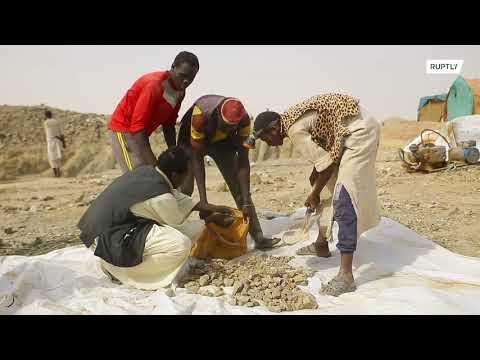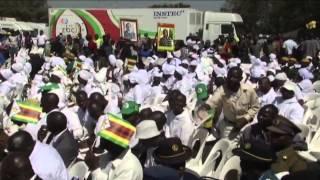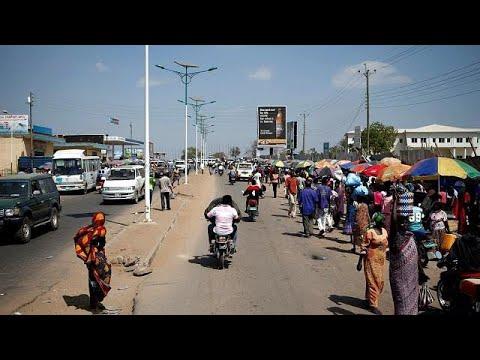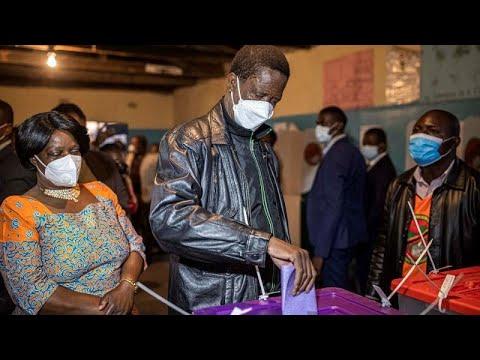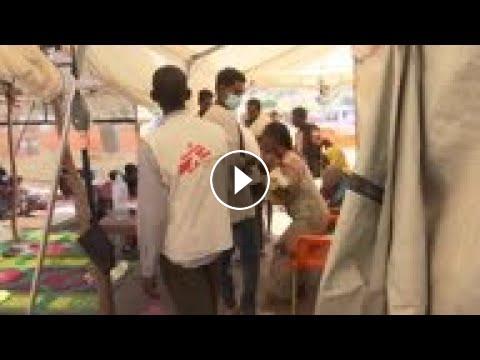There's concern over the risk of a coronavirus outbreak at crowded refugee camps in Sudan, where tens of thousands of people are sheltering after they fled Ethiopia to escape the fighting in Tigray.
Dr. Ali Mohammed, who runs a small clinic at Umm Rakouba camp in Sudan, says there's no way to test people to see if they have the virus.
Mohammed, from Doctors Without Borders (Medecins Sans Frontieres), says all he can do is hand out a mask to anyone who complains of flu-like symptoms.
"The person that comes here will go back to their camp or where he lives surrounded by people, so they could spread it very easily," he says. "This is all a risk that COVID could spread more and more if it is found."
Tens of thousands of people have fled the conflict between Tigrayan and Ethiopian federal forces in Ethiopia's Tigray region. They have crossed into neighboring Sudan, where virus numbers nationwide are rising rapidly.
More than 45,000 refugees from the Tigray conflict are now living in remote parts of Sudan, where they have taken shelter in crowded camps that have no coronavirus testing or treatment facilities.
Mohammed, the medical activity manager at the clinic, says at least 20% of the people who come to him have chest-related infections.
But while some might be suspected of having the coronavirus, there is no way of finding out.
So for now, anyone with flu-like symptoms is given a mask to help avoid infecting others.
If there is a coronavirus outbreak, Mohammed warns, it will be hard to contain because the refugees are crowded together in dire conditions and with little social distancing.
Many refugees are forced to share shelters and queue together for food, cash and registration with aid agencies.
There are few face masks to be seen.
Umm Rakouba camp is currently home to more than 10,000 people.
For refugees like 24-year-old Burhana Tesfay, from Shira, who came to the camp a week ago, coronavirus is a fear.
"The matter is scary. When you see people together, they may be infected with coronavirus," he said.
"People sit together and do not wear masks, of course it is scary. You see people always move collectively without masks, of course it is scary."
Find out more about AP Archive: http://www.aparchive.com/HowWeWork
Twitter: https://twitter.com/AP_Archive
Facebook: https://www.facebook.com/APArchives
Google+: https://plus.google.com/b/102011028589719587178/+APArchive
Tumblr: https://aparchives.tumblr.com/
Instagram: https://www.instagram.com/APNews/
You can license this story through AP Archive: http://www.aparchive.com/metadata/youtube/ca1121f481264174958657fd6b9ffce2
Dr. Ali Mohammed, who runs a small clinic at Umm Rakouba camp in Sudan, says there's no way to test people to see if they have the virus.
Mohammed, from Doctors Without Borders (Medecins Sans Frontieres), says all he can do is hand out a mask to anyone who complains of flu-like symptoms.
"The person that comes here will go back to their camp or where he lives surrounded by people, so they could spread it very easily," he says. "This is all a risk that COVID could spread more and more if it is found."
Tens of thousands of people have fled the conflict between Tigrayan and Ethiopian federal forces in Ethiopia's Tigray region. They have crossed into neighboring Sudan, where virus numbers nationwide are rising rapidly.
More than 45,000 refugees from the Tigray conflict are now living in remote parts of Sudan, where they have taken shelter in crowded camps that have no coronavirus testing or treatment facilities.
Mohammed, the medical activity manager at the clinic, says at least 20% of the people who come to him have chest-related infections.
But while some might be suspected of having the coronavirus, there is no way of finding out.
So for now, anyone with flu-like symptoms is given a mask to help avoid infecting others.
If there is a coronavirus outbreak, Mohammed warns, it will be hard to contain because the refugees are crowded together in dire conditions and with little social distancing.
Many refugees are forced to share shelters and queue together for food, cash and registration with aid agencies.
There are few face masks to be seen.
Umm Rakouba camp is currently home to more than 10,000 people.
For refugees like 24-year-old Burhana Tesfay, from Shira, who came to the camp a week ago, coronavirus is a fear.
"The matter is scary. When you see people together, they may be infected with coronavirus," he said.
"People sit together and do not wear masks, of course it is scary. You see people always move collectively without masks, of course it is scary."
Find out more about AP Archive: http://www.aparchive.com/HowWeWork
Twitter: https://twitter.com/AP_Archive
Facebook: https://www.facebook.com/APArchives
Google+: https://plus.google.com/b/102011028589719587178/+APArchive
Tumblr: https://aparchives.tumblr.com/
Instagram: https://www.instagram.com/APNews/
You can license this story through AP Archive: http://www.aparchive.com/metadata/youtube/ca1121f481264174958657fd6b9ffce2
Be the first to comment





